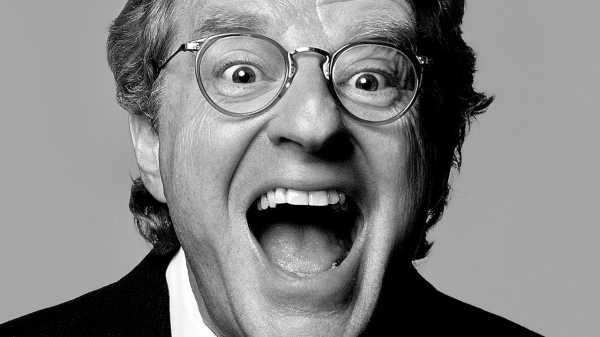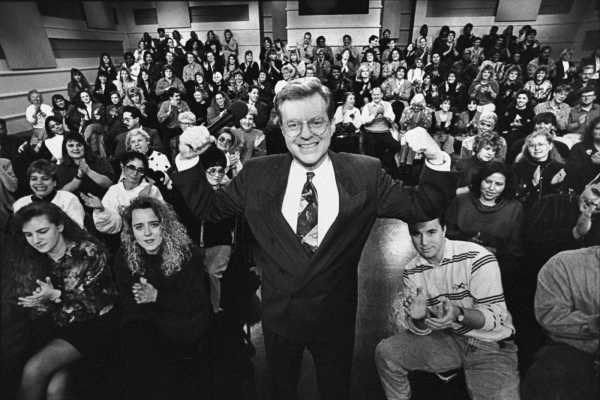
Jerry Springer is dead at seventy-nine. He had fantasized about his demise coming in his fifties. Judgment Day would take the shape of—what else?—a talk show, a reproduction of his program, “The Jerry Springer Show,” with Springer as guest, God at the mike. No hypocrite, a true believer in humiliation, Springer would offer his life up for final scrutiny. The trial-in-Purgatory is the conceit for his memoir, “Ringmaster!”—speaking to a theory of showmanship, which to so many and for so long looked like no theory at all. Not anymore. Should the scamp die a forefather?
Springer, a veteran of newscasting with many Emmys, licks his finger and the wind tells him, go outré. He had introduced his eponymous show, in 1991, as an issues-of-the-day digest—a natural roost for an erstwhile lawyer and politician with an arsenal of liberal bon mots. This first iteration was not remarkable, and so producers retooled, scripting the chaos we associate with Springer today. It drew millions of viewers. The show was more than popular, it was ubiquitous. The dramatic pivot of “Jerry Springer” the show perverted the ordinariness of Jerry Springer the man. You had to be there. The scene looks goofier with distance. What was this middle-aged man doing amid the crowd of whooping youth? What had he done to warrant the chant of his name? He was sweeter than Howard Stern, realer than Phil Donahue. His coolness gave “Jerry Springer” its plausible deniability. Railing against the family-values rhetoric of the decade, exploitation television still needed, at the time, the frame of a substitute moral universe. Tolerance worked. The fight dispersed, a commercial aired, and the show would end on a sombre Springer, delivering a variation of the Christian tenet, to do unto others as you would have done unto you. Entertainment as a gift from above.
Was he serious? Springer could play mogul; he could play pariah. He played chief self-deprecator, lampooning himself and his industry in a 1998 film, also called “Ringmaster.” The readymade argument available to him was that his product was attuned to true normalcy. There is no exhausting of the Real America phantasm; it validates all kinds of business. The family was broken and may not ever have been coherent in the first place. The observable mode of American engagement was altercation and not conversation, certainly not discourse. We are a physical culture. Launching a chair at a cheater’s face was speech. The eroticized people who had been made sick by prudery deserved to display their inner lives. Something about being in touch with whatever source is called the American id. He was catching with a studio full of cameras a melee that had long been brewing. Because he had exactly the pedigree of a snob, Springer delighted in deflating the snob attack. He delighted in calling his own show “stupid.”
In the dedication to his memoir, Springer muses affectionately that his mother would hate his show. Margot Springer gave birth to her son (né Gerald) in 1944, in a makeshift bomb shelter in the London Underground. The family, German Jews, settled in Queens, New York. Springer’s father, Richard, a salesman, reached middle-class security by founding a toy company; his most popular doll was the Emmett Kelly, fashioned after the sad likeness of the Depression-era drifter clown. The Springer household was one of engaged citizens. In “Ringmaster!,” Springer recalls being enamored, as a child, with John F. Kennedy’s speech at the 1956 Democratic National Convention, which necessarily implies that Springer was also enamored with television. He would leave New York to study at Tulane University. He pursued law at Northwestern University, graduating in 1968, and moved to Ohio to work for a firm, setting the stage for his next act.
For those who know about it, Springer’s political career, first as a member of Cincinnati’s city council and then as the city’s mayor, from 1977 to 1978, is good fodder for the idea of politician as entertainer, a sunnier example than Donald Trump, because the controversy, in Springer’s case, a bounced check at a massage parlor, is manageable and his affiliation was liberal. He had been a campaigner for Robert F. Kennedy. He had been anti-war and pro civil rights. As a politician, Springer knew how to spin shame. He referenced his parlor indiscretion in his campaign for governor of Ohio in 1982.

Springer entered professional civic life through the front door, pilloried the idea of it from the back.Photograph by Steve Kagan / Getty
It was the failure of the 1982 campaign that brought Springer to broadcasting. What do we make of Springer’s biography? His background did not come to bear on his performance on the show; there was only a faint lawyerliness to his questions, which weren’t meant to mature into true probes, because there were brawls to be had. It is true that Springer did not really launder his bona fides to court a better reputation. He knew what he was doing. And anyway, wasn’t reputation and shame the problem? His justification was the simplest: he knew that desire came from the base.
The chyron on the screen invited viewers to submit their stories for consideration for a future episode. The thing about scandal is that it presupposes importance. The “Springer” model integrated regular people into a conduit of attention, ephemeral but measurable attention. To come on that set meant a virtual promise of some kind of injury. There was an atmosphere—surrounding the audience to the guests to the viewers at home to the bespectacled m.c. himself—of no innocence. The terms created immunity: there is not a lot of effort to reappraise “The Jerry Springer Show,” as there has been for “The Tyra Banks Show,” or even the whole of the Oprah enterprise, because what violation contradicted the sign at the door? Its surface was its underbelly.
The show did not shutter until 2018. There are nearly five thousand episodes. The story of the host’s life is this: Springer entered professional civic life through the front door, pilloried the idea of it from the back. Everyone loves a precedent, and Springer, undeniably, exploded a standard for reality TV. The logic of exhibitionism he peddled has been elaborated on, perfected, brought slightly closer to documentary art. What he staged is now mainstream. He loved to live his business life on the defense, in part, I’m sure, because affiliating with the margins obscured the enormity of his accumulated wealth. You may have noticed, in the wake of Springer’s death, clips of “Jerry Springer” shared under the cover of nostalgia. They were being shared before this week. I think they are valued because the guests perform a rawer, credulous version of fame hunger. Fascination with his spectacle had been rooted in disdain, in the nineties, and in shock; rubbernecking, these days, as the shock has run dry, it looks quaint. ♦
Sourse: newyorker.com






